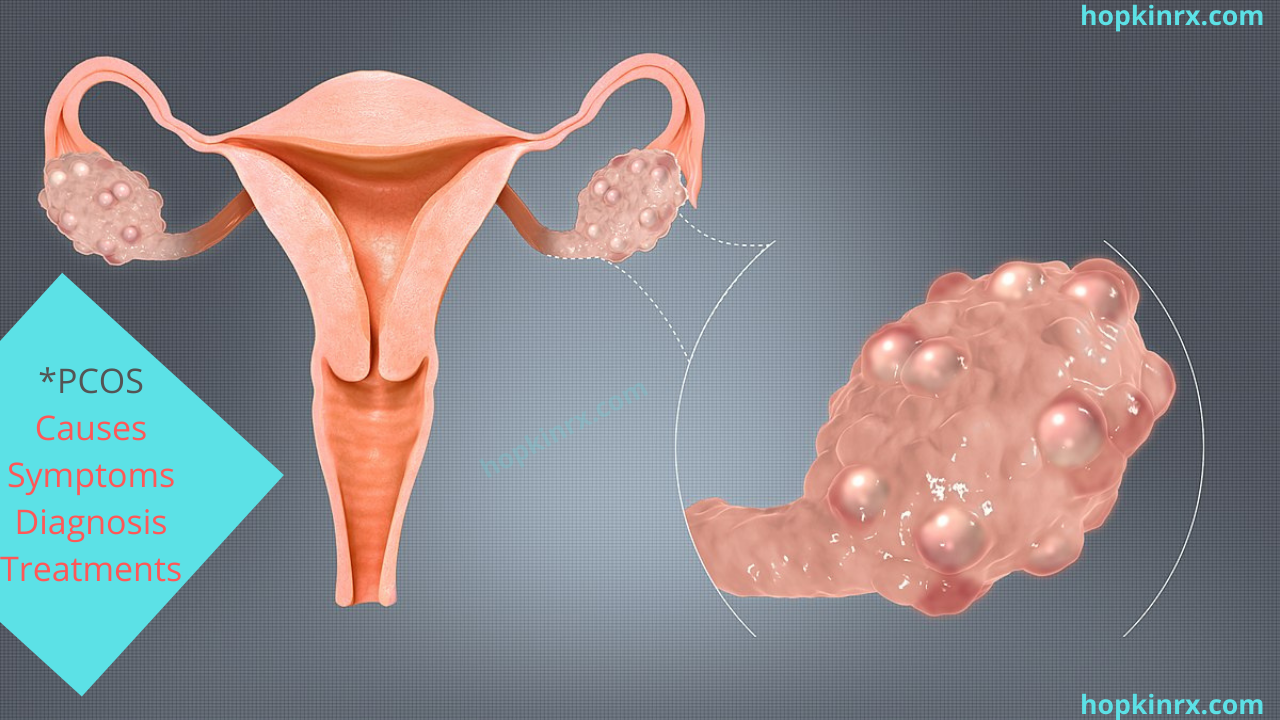Polycystic Ovary Syndrome (PCOS): Causes, 4 Main Symptoms, Diagnosis And Complete Treatment


What is Polycystic Ovary Syndrome (PCOS)?
Polycystic ovary syndrome, or PCOS, is a hormonal condition that ladies can get during their childbearing years. It can influence your capacity to have a youngster (your doctor will call it your richness). It can likewise:
- Stop your periods or make them difficult to anticipate
- Cause skin inflammation and undesirable body and beard growth
- Raise your gamble of other medical conditions, including diabetes and hypertension
You can seek medicines for the side effects. What’s more, you might get pregnant, in spite of the fact that you might have to take more time to work on your fruitfulness.
A few ladies with PCOS have sores on their ovaries. That is the reason it’s designated “polycystic.” But the name is misdirecting in light of the fact that numerous ladies with PCOS don’t have sores.
What Do Hormones Have to Do With PCOS?
Whenever you have PCOS, your regenerative chemicals are out of equilibrium. This can prompt issues with your ovaries, for example, not having your period on schedule or not getting it.
Your body gets chemicals to make various things going. Some influence your monthly cycle and are attached to your capacity to have a child. The chemicals that assume a part in PCOS include:
Androgens. They’re regularly called male chemicals, yet ladies have them, as well. Ladies with PCOS will generally have more significant levels.
Insulin. This chemical deals with your glucose. Assuming that you have PCOS, your body probably won’t respond to insulin in the manner in which it ought to.
Progesterone. With PCOS, your body might not have enough of this chemical. You could miss your periods for quite a while or experience difficulty anticipating when they’ll come.
What Are the Symptoms of PCOS?
The most widely recognized PCOS side effects are missed, sporadic, rare, or delayed periods. Overabundance androgens can cause balding, hair in places you don’t need it (like all over), and skin break out. Different side effects include:
- Obscured skin or abundance (skin labels) on the neck or in the armpits
- Mind-set changes
- Pelvic torment
- Weight gain around your center
What Are the Causes of PCOS?
Specialists don’t have a clue about each of the motivations behind why a few ladies get PCOS.

You may be bound to have PCOS assuming your sister or mom likewise has it. It could likewise be connected with issues that make your body produce a lot of insulin, which can influence your ovaries and their capacity to ovulate (or discharge eggs).
To Know More About Uterine Polyps.
What Complications Can PCOS Be Linked With?
In the event that you have PCOS and your androgen levels are excessively high, you have higher chances for various inconveniences. These can vary from one lady to another and include:
- Inconvenience getting pregnant. Pimples in the ovaries can obstruct ovulation. That is the point at which one of your ovaries delivers an egg every month. In the event that a sound egg isn’t accessible to be treated by a sperm, you can’t get pregnant. You might in any case have the option to get pregnant in the event that you have PCOS. In any case, you could need to take medication and work with a ripeness expert to get it going.
- Insulin issues and diabetes. Insulin obstruction might make your body make such a large number of androgens. In the event that you have insulin obstruction, the cells in your muscles, organs, and different tissues don’t retain glucose well overall. Therefore, you can have a lot of sugar traveling through your circulatory system. This is called diabetes, and it can create issues with your cardiovascular and sensory systems.
- Metabolic disorder. This gathering of side effects raises the gamble of cardiovascular illness . The side effects incorporate high fatty oil and low HDL (“great”) cholesterol levels, hypertension, and high glucose levels.
Other normal confusions of PCOS include:
- Wretchedness
- Nervousness
- Draining from the uterus and higher gamble of uterine malignant growth
- Rest issues
- Irritation of the liver
How Is PCOS Diagnosed?
No single test can analyze PCOS. Your primary care physician will begin by getting some information about your side effects and clinical history and by doing an actual test, and conceivably a pelvic test.
They could give you blood tests to quantify your chemical levels, glucose, and cholesterol. A ultrasound can actually look at your ovaries for sores, search for cancers, and measure the coating of your uterus.
How Is PCOS Treated?
Treatment will rely upon your side effects, your age, and whether you need to become pregnant. Assuming you’re overweight, losing a bit – – even 5% to 10% of your weight – – can encourage you. It additionally could help the manner in which your prescriptions work and work on your fruitfulness.
Your PCP might advise you to take the diabetes drug metformin (Glucophage) to bring down insulin obstruction, direct ovulation, and help with weight reduction.
On the off chance that you’re not intending to get pregnant, your primary care physician could recommend hormonal contraception, similar to the skin fix or the pill. These meds can assist with bringing down your gamble of endometrial disease, get your periods on target, clear up skin break out, and reduce additional body hair. If you would like to get pregnant, fruitfulness drugs can assist your ovaries with delivering eggs.
Get some information about meds to treat body hair and skin break out.
You ought to likewise see your primary care physician assuming that you’re having:
- Sporadic periods
- State of mind changes
- Unexplained weight gain
- Changes in your hair or skin
These side effects probably won’t be brought about by PCOS yet could flag other genuine medical problems.



